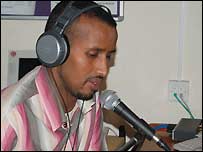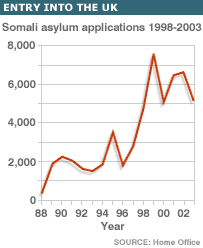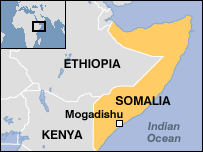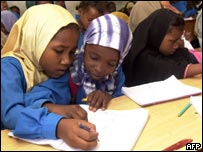Tuesday, May 30, 2006
BBC News community affairs

Adam Dirir: “We need one voice”
|
Highly visible on the street, but paradoxically a largely unknown people, uncomfortable questions are being asked about Britain’s Somali immigrants – and the answers are by no means easy to find.
When Adam Dirir and his colleagues at Somali Sound take to the airwaves on Friday evenings, they face an image crisis.
Headline after headline has talked about Somali crime gangs terrifying communities.
And yet, despite being such an easily identifiable minority – all Somalis descend from a single tribe and so share similar facial characteristics – after more than a century of Somali presence in the UK, little is known about who they are.
There’s a similar dearth of knowledge about the apparently very serious problems they face in adjusting to life here.
And so Adam, who also produces Somali Eye magazine, goes on the airwaves on London’s Sound Radio to tell it like it is – a mixture of harsh reality and encouraging words to a community he says can make it.
“There is a lot of anger out there,” says Adam, referring to the unrest among fellow Somalis. “We need to show the role models and we need to show other communities that we have been here for decades – and will be here for decades.”
Somalis have long formed close-knit communities in Britain. For more than a century, their faces have been familiar in London, Cardiff and Liverpool after the arrival of seamen and traders.
But the situation changed dramatically with the rapid arrival of asylum seekers and refugees in the 1990s, fleeing civil war. Since the ousting of Somalia’s government in 1991, much of the country, situated on the eastern “Horn of Africa”, has been in a state of violent anarchy, perpetuated by warlords with rag-tag armies of young men.
Countries don’t get more chaotic than Somalia and many who fled are now living in Britain, having originally gained refuge in other European states.
In Britain, anecdotes have percolated into wider society that suggest many of the internal disputes that have bedevilled Somali society have travelled with the diaspora.
Unclear picture
Telling the story of Somalis in Britain is hard because there is a chronic lack of nationwide research. The 2001 census suggested there were 43,000 Somalis in the UK. But other experts suggest at least 95,000 and as many as 250,000.
|
INTEGRATION ISSUES
 Mohamed Ali, former Somali councillor, Liverpool
|
While they represent one of the largest ethnicities, the only significant research has been localised case studies. These tend to show that Somalis children are widely regarded to be underperforming at school. But limited statistics from some London boroughs are mixed, showing below average exam grades, but improvements, particularly among girls.
The community is also extremely mixed, coming from different clans and different social backgrounds, including a high proportion of skilled professionals who have not been able to find work in their field in the UK. Nobody knows how many of the young Somalis in Britain have brought with them traumatic experiences of war.
The Information Centre about Asylum and Refugees (Icar), a body of experts at London’s City University, recently pulled together all it could find on Somalis in Britain.
Dr Chris McDowell, head of Icar, says that the experience of Somalis in the UK is extremely complex and differs greatly to comparable communities that have fled war zones.
A key factor is the Somali tradition of nomadic and collective identity – what you are part of informs who you are, says Dr McDowell.
“The politics and power struggles in Somalia has had an impact on the coherence of the communities within the diaspora,” says Dr McDowell.
 |
“The same thing cannot be said for groups such as the Sri Lankans because they are overwhelmingly Tamil and have a coherence and unity within themselves which keeps them together in a new place.”
“In Somalia, you are part of something, part of a clan along with your family, your co-religionists. If you remove that anchor, because these groups are not recreated, then people feel adrift.” Crime
The contrast with the Tamil communities is important because, in general terms, large and unified groups get cash for projects, such as language integration schemes, advice bureau and so on. London has a plethora of small Somali groups, many of whom are essentially directly competing with each other for the same state or charitable funding. Other ethnic minorities in the UK have avoided this pitfall because they don’t suffer from inter-communal differences.
And it’s in this potential vacuum of missing social networks that some alienated young Somali men have forged a defensive gang identity, say experts.
Unclear of where they stand between the traditionalist clan viewpoint of their elders and the individualist creed of western societies; between protection through community and standing alone within society; the easy answer for some is to adopt a readily available, aggressive street persona, largely based on gangsta rap culture.
“I think many of these young people try to find a group they can ally with,” says Dr McDowell. “Gangsta culture provides that identity because it’s about male power, is about making people scared and it seems that some Somali boys gravitate towards it because it allows them to be in control.”

Somali refugees are spread far and wide – these girls are in Yemen
|
Adam Dirir of Somali Voice says that this defensiveness is not helped by under-reporting in the media of incidents where Somalis are victims, and over-reporting of incidents where Somalis are the alleged perpetrators.
Nevertheless, he says the priority has to be support for youths who have fallen out of education and have drifted apart from their community.
“We need the Somali youth workers who can communicate with these kids. If you don’t have the youth workers, how can you hope to understand their problems?
“We need one voice, one fusion and to be more open about the problems and issues. We need to accept that we are here, not with one leg in this country and another in Somalia.
“There are a lot of angry kids and we just don’t know what to do. There’s a lot of pain in the community.”
Mohamed “Jimmy” Ali says he has witnessed that soreness – and says we need to ask questions for how Britain integrates troubled minorities.
Outsiders
Two years ago the Liverpool social worker became what is widely believed to be Britain’s first Somali councillor, although he has since lost his seat.
“Somali kids just don’t get any help,” he says. “They come from a war zone and they have no idea about [Britain] in terms of its culture, religion or even how education works. And that is why they need support.”
In Liverpool, Mr Ali has found Somali children unofficially excluded from lessons, sitting alone in the corridor, because teachers had effectively given up trying to communicate.
This compounds the feelings of alienation, frustration and increases the likelihood of racist bullying. In turn, young Somali men on the receiving end are all the more likely to become defensive and see society in terms of us and them.
“Until society understands the needs of these [Somali] communities, it will always have problems. Some asylum seekers are simply released into society without any funding or support and one wonders how on earth they manage to exist.”
The BBC News website will be featuring more stories about Somalis in the UK later in the summer. If you want to have your say, use the form below.
Add your comments to this story using the form below.






